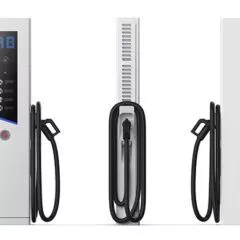4 Types of Electric Car Home Charging Station
Charging Electric Vehicles with Solar Energy

Electric vehicles, or EVs, currently make up only a small percentage of all vehicles sold worldwide. Most major automakers are now developing electric car home charging station. The growth of EVs will be more explosive in the next 5 to 10 years.
Many drivers are considering an EV or hybrid vehicle as an option for their next car purchase, but price, charging and range worries are keeping many people still fear.
Charging Electric Vehicles with Solar Energy
One of the big advantages, especially for those who have rooftop solar, or are considering installing a solar system, is the ability to charge an electric vehicle with solar energy. only me. Charging with its own electricity could essentially eliminate the 'fuel' cost of an EV altogether.
However, in practice, this is not always as easy as you think. In this article, we discuss the different electric car home charging station available. Moreover, we will analyze the different charging (time) options to suit a variety of lifestyles. Furthermore, we will consider the limitations of the use of rooftop solar and home batteries to charge EVs.
Battery capacity electric car home charging station
Before we get into the details of the different EV chargers, such as charging speed, it's best to have a basic understanding of the EV's battery capacity and driving range. The average EV has a battery capacity of 60kWh.
Moreover, it provides an average driving range of about 350 km. Similarly, it depends on how efficient the electric cars are. The lighter, more efficient EV can use 10kWh per 100km, the Porsche Taycan high performance EV can use 20kWh or more per 100km driving.
Frequently asked questions about EV charging with solar and battery power
- What are my home EV charging options?
- Which charger is best suited for rooftop solar?
- How long does it take to charge an EV from my rooftop solar system?
- Can I use batteries at home to charge an electric vehicle?
- Electric car charger at home
Charging Electric Vehicles With electric car home charging station, the first thing that comes to mind after buying an electric vehicle is what charging options are available. Are they compatible with rooftop solar systems?
Before we get into the details of the various charging options, you should know that most EV chargers are actually relatively simple devices. We can install them on any home or business whether you have solar installed or not. There are also a few dedicated solar inverters with built-in EV chargers that we will cover later in this article.
There are 4 main types of electric car home charging station
- 10A socket charger – 1.4kW to 2.0kW
- Single-phase home EV charger – 3.3kW to 7.0kW
- Three-phase home EV charger – 10.0kW to 22.0kW
- Solar inverter combined with EV charger
- EV plug-in charger – 2kW
Most EVs come equipped with a simple charger that can be used with any regular 10A wall outlet. These small, low-capacity chargers will typically charge the EV in 12-24 hours depending on the EV's battery size and battery capacity at the original charging point.
Most 10A EV electric car home charging station can usually charge at a maximum rate of 2.2kW, but will typically draw between 1.7kW and 2.0kW, which will add up over a range of about 10 to 14km per hour depending on the vehicle type.
- Single phase EV charger – 7kW
Single-phase home EV chargers are small wall-mounted devices that come in a variety of styles and options. Most are designed at 32A. This equates to 7kW of power and can give your vehicle a range of 40 to 50 kilometers per hour when fully charged. With the average person driving less than 50km a day, you should theoretically only need an hour or two to recharge your car each day.
- Three-phase EV charger – 22kW
Simple three-phase home EV chargers look a lot like wall-mounted single-phase devices and come in a variety of designs. They are usually rated at 32 Amps but because of their 3-phase they can deliver three times as much power. This is roughly equivalent to 22kW of charging power. At full charge, this can give your car a range of 120 to 150 km per hour.
4. Combined solar inverter and EV charger

A recent technology is the combined solar inverter and EV charger that can charge directly from rooftop solar. Integrating the charger with a solar inverter is a smart solution.
It eliminates the need for a separate electric car home charging station along with additional wiring and electrical upgrades to accommodate the charger. The only disadvantage is that the inverter must be installed in the garage or near the car.
Right now, there aren't many options, a single 2-in-1 solution that can charge from solar or in boost mode it can charge copper from solar energy and the grid
Smart EV charger
If you already have rooftop solar installed, you can use smart EV chargers to maximize your own solar self-sufficiency. Essentially, this device will monitor your solar power generation. Instead of exporting excess solar energy to the grid, it will transfer it to your EV charger.
This way, you'll also have backup in the event of power outages from the grid, bad weather, or intermittent interruptions.
How smart EV chargers work
When you plug an EV into a standard electric car home charging station, the charger will generally draw the maximum amount of energy possible to charge the vehicle. Most dedicated EVs charge 3.5kW to 7kW although the amount of solar you generate can be much less, especially during cloudy weather.
Another point of smart chargers, it uses a special CT sensor. It comes near your main power connection to monitor energy to and from the grid. When it detects any energy flowing to the grid, it will allow the EV charger to start charging at a specific designed maximum.
Two-way charger
An emerging technology that will be deployed in the next few years is “Vehicle to Grid” or V2G, known as two-way chargers. This sounds complicated, but it simply allows power to flow to and from your electric vehicle.

